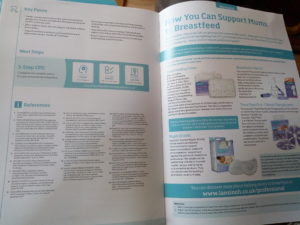Book review: Informed is Best, by Amy Brown
 This afternoon I opened the latest copy of MIDIRS, and a couple of inserts dropped out of it. They are training modules, one on infant skincare, and one on breastfeeding challenges. I browsed the latter for a moment, noticing a paragraph mentioning a Cochrane review on the treatment of nipple pain:
This afternoon I opened the latest copy of MIDIRS, and a couple of inserts dropped out of it. They are training modules, one on infant skincare, and one on breastfeeding challenges. I browsed the latter for a moment, noticing a paragraph mentioning a Cochrane review on the treatment of nipple pain:
However, the latest Cochrane review (2014) found insufficient evidence to recommend breast milk or any other intervention for treating nipple pain.”
So I looked up the Cochrane review, and here’s what it actually says:
Currently, there is not enough evidence to recommend any specific type of treatment for painful nipples among breastfeeding women. These results suggest that applying nothing or expressed breast milk may be equally or more beneficial in the short-term experience of nipple pain than the application of an ointment such as lanolin.
The picture above shows who produced this document: Lansinoh. A company with a vested interest in selling an ointment such as lanolin.
With this in mind, I picked up my copy of Amy Brown’s latest book, Informed is Best, a book which purports to help the reader fight their way through the tangle of misinformation, opinion, and hidden agendas that gets deeper and deeper as you wade into pregnancy, birth and parenting. This is a very useful and important book, and is more important than ever in an era of fake news, limited attention spans, and a distrust of experts – as the book itself explains in glorious detail.
What I find amazing about Amy’s writing is her ability to gather so much information, and distil it into meaningful and accessible writing; in fact she quotes a study where a mother describes wanting “mom-level detail from an expert” (p226) and this is exactly what we have in this book. Amy sets the context, looking at how the media, social media, and the patriarchy shape our access to good quality information. She explains different types of research, and even gives us a quick blast of how to understand statistics in a way that didn’t actually make me want to poke my own eyes out. The text is wonderfully seasoned with examples, including unpicking many twisted media reports of research; and presented in her marvellously offhand-but-serious-really style. For a book about research, it’s just such an enjoyable read.
One thing I especially love about this book is her exploration of her own bias, along with sections that really should make the reader reflect on their personal biases. The Dunning-Kruger effect really gave me pause for thought. How often do I dismiss someone’s work because of a connection with something I didn’t like reading or hearing? It definitely happens.
Each chapter ends with a practical list of ways to keep informed, summarising the detail within. My favourite is: “To any female expert reading this, I urge you to have the confidence of a mediocre White man.” (p124). Oh yes indeed.
If you want more, I interview Amy about the book in episode 56 of Sprogcast. To get your copy of the book, use our 10% discount code SPROGCAST at the Pinter & Martin checkout here.
